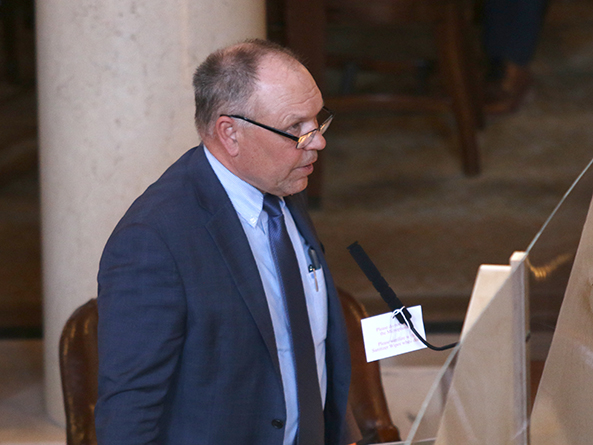From the Unicameral Update:
Introduced by Plymouth Sen. Tom Brandt, LB324 allows the acquisition of meat through an animal share — an ownership interest in an animal or herd of animals created by a written contract between a consumer and a farmer or rancher — under certain conditions.
Among other requirements, the animal share owner, or someone acting on their behalf, must receive the meat, and the farmer or rancher must provide the consumer with a description of their livestock health and processing standards.
A farmer or rancher who offers an animal share must be a Nebraska resident and maintain a record of each animal share sold. The name and address of each individual with an ownership interest in the particular livestock must be presented to the processor prior to slaughter.
LB324 also creates an independent processor assistance program that, if funds are made available, will provide funding to certain federally inspected, state inspected or custom-exempt slaughter and processing facilities in Nebraska that employ fewer than 25 people.
Recipients may use the funds to pay for capital improvements, utilities upgrades, equipment, technology, building rentals, costs associated with increased inspections and educational and workforce training.
Lawmakers voted 48-0 to pass LB324.
From the Center for Rural Affairs:
The Center for Rural Affairs is applauding Nebraska and Iowa lawmakers for their unanimous approval of bills to assist small meat processors and livestock producers as they work to clear obstacles brought on by the coronavirus pandemic.
“The COVID-19 pandemic has tested and challenged both processors and producers across the country,” said Johnathan Hladik, policy director for the Center. “Seeing lawmakers from Nebraska and Iowa approve their respective bills on the same day shows a strong level of support for our small family farms and gives processors the tools they need to grow their businesses, create jobs and increase activity on our main streets.”
LB 324, introduced by Sen. Tom Brandt, makes it easier for consumers to buy meat directly from producers or processors. It also creates the Independent Processor Assistance Program to help processors with expansion, modification, or construction of buildings; efficient packaging, processing, and storage equipment; technology to improve logistics or enable e-commerce; and educational or workforce training programs. Passage came on a 48-0 vote.
Hladik thanked Sen. Brandt and Rep. Ingels for leading the effort to address backlogs that began in 2020 when outbreaks of COVID-19 impeded work at many regional packing plants.
“When those plants paused, large-scale beef and pork producers turned to local processors to fill the void. This created a debilitating bottleneck at local meat lockers,” Hladik said. “Lawmakers have cleared the way to bring needed solutions for producers, local small business owners and consumers of quality beef and pork and we eagerly await the signatures of Govs. Ricketts and Reynolds.”

 Sen. Tom Brandt
Sen. Tom Brandt